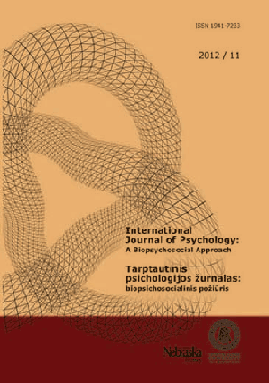Ethnicity, language and poverty predicting scores on the nebraska state accountability reading test
Ethnicity, language and poverty predicting scores on the nebraska state accountability reading test
Author(s): Brittney Cates, Jessica Shepard, Tammi Ohmstede Beckman, Kaylee MessersmithSubject(s): Psychology
Published by: Vytauto Didžiojo Universitetas
Keywords: High-Stakes Testing; Academic Performance; Diversity; English Language Learners (ELL); Poverty Aukštų pasekimų testavimas; akademiniai pasiekimai; įvairovė; anglų kalbos besimokantys mokiniai; skurdas
Summary/Abstract: Background. Ethnicity, language and poverty have all been linked to the academic achievement of children within our educational system. Purpose. The purpose of this study was to determine if ethnicity, ELL and poverty are indicative of third, fourth, and fifth grade performance on the Nebraska State Accountability Reading Test (NeSA-R). Methods and Results. An archival data set was volunteered by an elementary school in a small Midwestern town. The data set for the ethnicity portion included 347 students from two schools combined, while the data set for the poverty/ELL subset included 197 students from only one of the schools as the other did not have poverty/ELL data. An analysis of the data concluded that ethnicity is not a significant factor in the performance scores on the NeSA reading test among the three ethnic groups (p> .05). Additional analysis of the data set concluded that there is a significant difference between students who receive free and reduced lunch and are ELL and students who only receive free and reduced lunch (t(195)=6.551, p<.05). Conclusions. The findings of this study provide implications that ethnicity alone will not have a significant impact on student performance on the NeSA-R. Results indicated the students who are likely to have the lowest scores on this standardized, high-stakes test are those who are ELL and receiving free and reduced lunch. Thus, providing implications for how the results of this standardized test are used when looking at the scores of students from diverse backgrounds. Santrauka. Problema. Etniškumas, kalba ir skurdas švietimo sistemoje yra susiję su vaikų akademiniais pasiekimais. Tyrimo tikslas. Šio tyrimo tikslas – įvertinti, ar etniškumas, anglų kalbos mokymasis ir skurdas gali numatyti trečios, ketvirtos ir penktos klasių atsiskaitomojo Nebraskos valstijos skaitymo testo (NeSA-R) rezultatus. Metodika. Tyrime analizuoti archyviniai duomenys, kuriuos geranoriškai suteikė viena nedidelio JAV Vidurio Vakarų regiono pradinė mokykla. Etniškumo aspektas analizuotas 347 mokinių duomenų imtyje, sudarytoje iš dviejų mokyklų duomenų. Anglų kalbos mokymosi ir skurdo aspektai analizuoti 197 mokinių imtyje, tik iš vienos mokyklos duomenų, nes antroji tokios informacijos negalėjo pateikti. Rezultatai. Tyrimo rezultatai parodė, kad etniškumas nėra reikšmingas veiksnys numatant NeSA-R skaitymo testo rezultatus trijose etninėse grupėse (p>0,05). Papildoma duomenų analizė atskleidė reikšmingus skirtumus tarp mokinių, kuriems teikiami nemokami ar pigesni priešpriečiai ir kurie mokosi anglų kalbos, bei tų, kuriems tik teikiami nemokami ar pigesni priešpiečiai (t (195)=6,551; p>0,05). Išvados. Tyrimo rezultatai parodė, kad vien etniškumas neturi reikšmingos įtakos NeSA-R rezultatams. Paaiškėjo, jog žemiausiais skaitymo testo balais įvertinti mokiniai, kurie mokosi anglų kalbos ir valgo nemokamus ar pigesnius priešpiečius.
Journal: Tarptautinis psichologijos žurnalas: biopsichosocialinis požiūris
- Issue Year: 2012
- Issue No: 11
- Page Range: 31-47
- Page Count: 17
- Language: English

